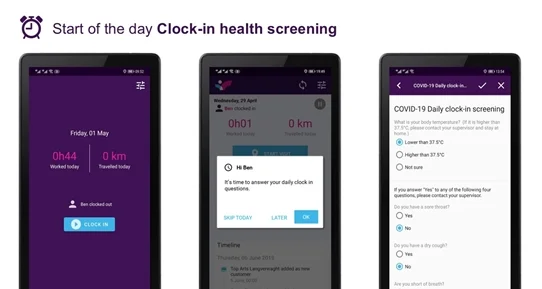SKYNAMO, has announced significant COVID-19 upgrades to protect a company’s salesforce while trying to sustain competitive advantage, alongside nationwide training to protect the lives of mobile sales teams and the customers they are visiting.
For most organisations, personal contact is essential to achieving sales goals. According to research undertaken by Xant, companies with field agents have a closing rate that’s around 30.2% higher than those who rely on calls or emails and the deals are usually 130.2% larger. This makes field sales a critical investment for companies looking for stability in the current market and economy.
The data presents a real challenge. Meeting face-to-face is competitive advantage necessary in the current economy to stave of competitors vying for the same customers who now have tighter budgets and are looking to cut costs, but business owners must not risk the health and safety of an organisation’s people. The app potentially opens up opportunities for organisations that have been severely affected in a landscape defined by social distancing and minimal contact.
The COVID-19 Daily Clock-in Screening Form ensures that organisations in industries that require face-to-face engagement for sales enablement are able to protect their employees and remain aligned with the rules for occupational health and safety as outlined by the South African Department of Employment and Labour.
“There are stringent new regulations for doing business and it’s important for companies to feel that they are doing everything they can to protect their employees and their customers,” says Sam Clarke, Founder & CEO of Skynamo.
“The field sales agents log into the app from the moment that they start the day and it asks a series of questions, that can be customised, that pertain to the virus,” says Clarke. “These include things like temperature, general health, a cough – the basic checklist for the symptoms of the disease. Most companies take these details down when the employee enters the building – their temperature is taken and they’re asked a series of questions. For those in the field, this isn’t possible which is where the app comes in.”
The teams take their temperature and details remotely and provide these to their managers using an accessible digital record. They also complete a different list once they’ve seen a customer. They can answer customisable questions around whether the customer was ill, or how well the company adhered to social distancing, for example. This not only ensures detailed record keeping, but it also ensures that legal procedures are tightly followed in the event that the agent does get ill and needs to apply for worker’s compensation.
“The application gives the business a detailed record of field agent movements and this information can be used to track the illness if someone gets sick,” adds Clarke.
